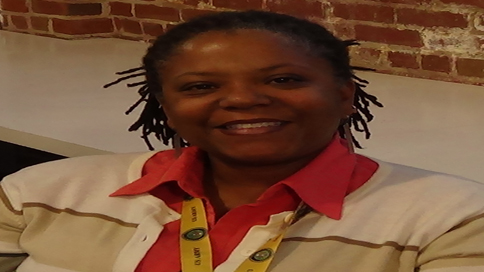
17 Jan New veterans rep helps vets make smooth transition
Charlotte Works welcomes Bridgett Wilson, disabled veterans outreach program specialist. She splits her time between the Employer Engagement Center and the Division of Workforce Solutions (DWS) office at 5601 Executive Center Drive. Wilson’s goal is to help all veterans, regardless of disability status, overcome barriers to employment and make a smooth transition to the civilian workforce.
She is a veteran herself and a native of New Jersey who moved to Charlotte in 1999. Wilson has three children, two dogs and a penchant for metal-smithing in her free time.
She sat down with News @ The Works to tell us more about herself and her role helping veterans get to work.
Welcome to Charlotte Works! How long have you been with us and how did you get here?
I’ve been at Charlotte Works since the second week in December [2013]. I was recommended through the veterans unit at the Division of Workforce Solutions.
What’s your role at DWS?
I’m a disabled veterans outreach specialist – meaning that, although I specialize in disabled veterans, I assist all vets with any type of barrier to employment and provide career guidance as needed.
I also do case management with Chapter 31 vets [federal vocational rehabilitation] who are degreed, from an associate’s to a master’s.
What will you do as our “vet rep?” What will your role here be?
My role and duties here at Charlotte Works will be no different from what I do at DWS.
Are you a vet yourself? Tell us about your service.
I am. I completed two tours of service totaling eight-and-a-half years in the Army. I’m an Air Force brat, so I’ve been around military life for most of my life. I come from a family of Army and Air Force officers. However, I chose to be an enlisted soldier.
I can relate first-hand to the difficulties of transitioning from a military lifestyle into the civilian world. When I meet a newly discharged service member, I let them know that their fears are valid and I share my own experiences with that person. When I got out, I didn’t even know how to turn on the electricity. I didn’t have to – the Army takes care of all that for you. Here I was, married and with a child, and I had to pull my friend aside and say, “I don’t know how to do this. I need your help.” So I know how difficult the transition is.
What are the biggest barriers to veterans finding civilian employment, either real or perceived?
One of the biggest obstacles, especially with older vets, is that they have criminal records. It’s always challenging finding an employer who is willing to give them a second chance. But a barrier can be almost anything. They could say, “I don’t have day care.” I exhaust all my resources.
Do employers have perceptions about hiring vets that aren’t necessarily accurate? How can you help vets address and overcome those perceptions?
I feel that many employers have reservations about hiring veterans who have been in combat. They have this perception that the majority of veterans suffer from PTSD [post-traumatic stress disorder] and that’s absolutely false. That’s why I advise veterans not to put their combat experience on their resume. If you say, “I went through grenade training,” that’s not good!
In an effort to address and overcome those perceptions, I conduct outreach to employers – I visit employers to explain the marketable skills a veteran possesses, as well as ensure that they’re aware of various tax breaks that are available for hiring vets, like WOTC [Work Opportunity Tax Credit].
How can veterans best market themselves and their skills in the civilian employment marketplace?
Use the ONET system and www.mynextmove.org to help translate their military experience into civilian experience. I stress the importance of using civilian jargon as opposed to military jargon. For example, if a veteran served in field artillery, it’s to his advantage to focus on his leadership skills, as opposed to his tactical skills, when preparing his resume.
Your primary focus is on disabled vets; what special or specific services and/or resources can/do you provide to them?
I’m also a member of Disabled American Veterans [DAV]; I serve as treasurer and service officer. As a service officer, I assist veterans with submitting proper paperwork for military medical claims and other services that were not automatic upon their discharges from military duty.
Can/will you work with a non-disabled veteran?
Absolutely! I just had a vet who was homeless, sleeping in a storage unit. I used my connections with my DAV chapter and gained permission to put him in an extended-stay hotel for two weeks. This veteran was recently awarded housing and moved into an apartment. My DAV chapter pulled together and donated furniture and money for food. We’re absolutely a family!
If a veteran wants to contact you, what should s/he do?
Contact Chris Miller [resource associate], who will pass an email to me. We’ll also start identifying veterans in orientation so I can introduce myself and offer services, especially disabled vets and older vets.
What if a vet isn’t a Charlotte Works client? What should s/he do?
Veterans are welcome to contact me at the DWS office, and if they’re in need of DAV services, I have business cards in the office.
When a vet contacts you, what can s/he expect to happen? What’s the process for that person? What information does s/he need to have ready for you?
They just need themselves. I walk them through every step, especially getting them into the system and showing them how to use NCWorks Online. It’s a great tool.
You can find Bridgett Wilson at Charlotte Works on Thursdays from 8 a.m. to 5 p.m.
Connect with Disabled American Veterans Queen City Chapter 10.


